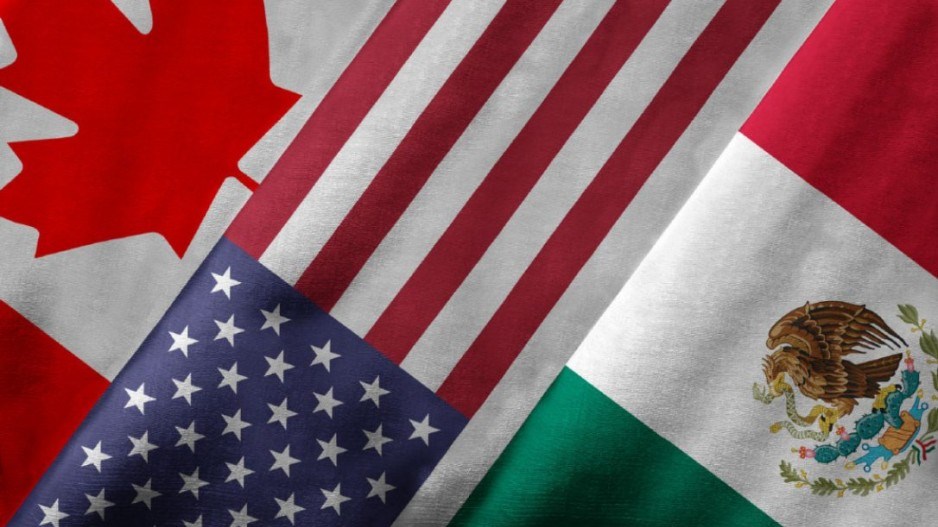On the final day of November 2018, the heads of government of Canada, the United States and Mexico signed a new free-trade deal, known in this country as the Canada-United States-Mexico Agreement (CUSMA).
The ceremony, which took place in South America, was rushed for various reasons, including the fact that Mexican president Enrique Peña Nieto had just a few hours left in his tenure.
At the time, U.S. President Donald Trump reverted to his customary over-the-top descriptions (“So important … a truly groundbreaking achievement”) to explain what had been reached. But how do Canadians, who are mostly immune to Trump’s showboating, feel about what free trade has done for the country?
A recent Research Co. survey found that only one in five Canadians (20%) believes Canada has benefited the most from the original North American Free Trade Agreement (NAFTA) since it was signed in 1994. More Canadians believe Mexico (26%) and the United States (35%) are the “winners” in the free-trade deal, while 19% are undecided.
There are some staggering differences when the views of specific demographics are gauged. Men are significantly more likely than women to say Mexico “won” NAFTA (34% to 18%), and Canadians aged 55 and over are significantly less likely to think Canada is the victor (15%) than their counterparts aged 35 to 54 (22%) and aged 18 to 34 (25%).
On a regional basis, the three areas that are the least likely to believe that Canada has “defeated” the other North American countries on free trade are Alberta (6%), British Columbia (11%) and Atlantic Canada (16%).
The negotiations that led to NAFTA’s death and CUSMA’s birth were precipitated by Trump’s administration. The legislation that is required to ratify CUSMA is in second reading in the House of Commons. If the new deal is not ratified before the October federal election, it may not stay in place afterward.
There is no clear timetable for Canada’s legislature, but Foreign Affairs Minister Chrystia Freeland has said the country intends to move “in tandem” with the United States to ratify the deal.
This might prove problematic. The Republican party no longer holds a majority in the House of Representatives, so ratification in the United States may not be as smooth as once envisioned. In addition, the start of the longest presidential primary season in history may play a role in the immediate future of CUSMA.
When Trump was a candidate for the Republican presidential nomination, he threatened to “tear up” NAFTA many times in speeches and rallies. The 2020 campaign may produce a Democratic party front-runner who may prefer to take it slow on new trade deals and ask his fellow party members in the lower house to wait for a more competent head of state before pondering ratification.
Mexico, it is safe to say, is not a problem in this calculation. The country has summarily genuflected to Trump’s threats of tariffs, effectively enabling a foreign entity to dictate immigration policy within its borders.
For many longtime observers of Mexican politics, the sight of the current government giving in to the wishes of the United States was not astonishing. Mexican President Andrés Manuel López Obrador – as well as Foreign Secretary Marcelo Ebrard – paid US$4.3 million to a firm headed by Trump’s personal lawyer Rudy Giuliani for advice to deal with security concerns when both served in Mexico City’s government. López Obrador raucously claimed during his campaign that he would put Trump “in his place” once he became Mexico’s president. The Mexican government’s actions suggest that the “place” López Obrador alluded to is a throne.
Setting aside Mexico’s current foibles, almost half of Canadians (48%) want to see CUSMA ratified, while just over a third (36%) believe the deal should be rejected. Liberal party voters in the 2015 election (56%), men (53%), Canadians aged 18 to 34 (57%) and British Columbians (51%) are more likely to believe that it is better to just say yes to the deal now.
In any case, Liberal Party of Canada supporters can take solace in the fact that negotiations towards the new free-trade deal have not been particularly detrimental. Just over three in five Canadians (63%) express confidence that the federal government will do what’s best for Canada when it comes to international trade.
The regional breakdowns are also important for Justin Trudeau’s political future. Majorities of British Columbians (63%), Ontarians (60%) and Quebecers (56%) express confidence in the government, while the results are more restrained in Alberta (50%), Atlantic Canada (also 50%), and Manitoba and Saskatchewan (49%). The seats that may enable Trudeau to remain in government are in the provinces where, on the free-trade front, the government’s actions are welcomed. •
Mario Canseco is president of Research Co.
Results are based on an online study conducted from May 31 to June 3, 2019, among 1,000 adults in Canada. The data has been statistically weighted according to Canadian census figures for age, gender and region in Canada. The margin of error, which measures sample variability, is plus or minus 3.1 percentage points, 19 times out of 20.




